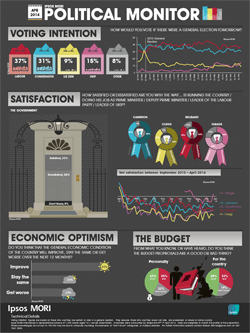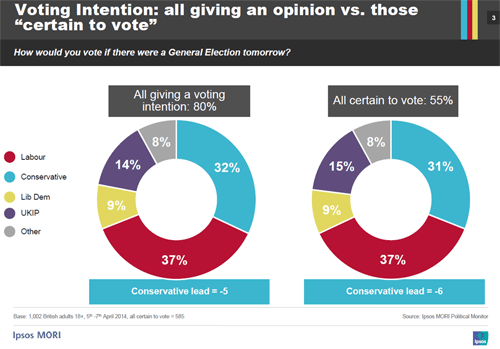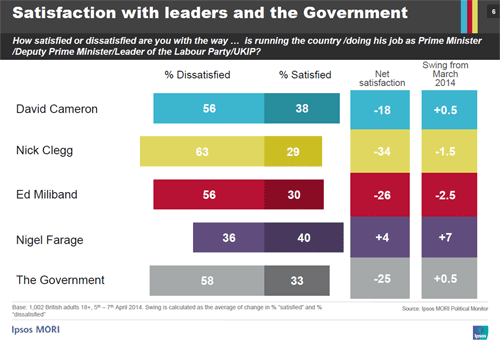Ipsos Political Monitor April 2014
Ipsos's Political Monitor for April shows that it has been a good month for George Osborne, with satisfaction in his performance as Chancellor at its highest level since Gordon Brown in 2006.
Boost for UKIP and Nigel Farage after Europe Debates
CON 31 (-1); LAB 37 (+2); LIB DEM 9 (-4); UKIP 15 (+4)
Ipsos’s Political Monitor for April shows that it has been a good month for George Osborne, with satisfaction in his performance as Chancellor at its highest level since Gordon Brown in 2006, and the highest for a Conservative Chancellor since Geoffrey Howe in 1980. Just under half (47%) are satisfied in Mr Osborne’s performance, with 44% dissatisfied. This comes during a period of steady economic optimism, with 49% believing the economic condition of the country will improve over the next year and 24% believing it will get worse, giving an Ipsos Economic Optimism Index score (% get better minus % get worse) of +25. Last month’s Budget is considered to be good personally for the highest proportion of Britons since Gordon Brown’s 2002 Budget and the best for a Conservative Chancellor since 1987, while it is considered the best Budget for the country since Mr Osborne’s inaugural Budget in 2010. Just under half (48%) say the Budget was good for the country, with 33% saying it was bad; 43% think the Budget was good for them personally, with 35% saying it was bad.
Despite this positivity, the vast majority of Britons think there is a ‘cost of living crisis’ in the UK. Ipsos split the sample, with each of the following question allocated to half of respondents:
V1: Some people believe that despite recent growth in the UK economy, the cost of living has continued to rise for many people, creating a ‘cost of living crisis’. To what extent, if at all, do you agree or disagree that there is currently a ‘cost of living crisis’ in the UK?
V2: Ed Miliband has said that despite recent growth in the UK economy, the cost of living has continued to rise for many people, creating a ‘cost of living crisis’. To what extent, if at all, do you agree or disagree that there is currently a ‘cost of living crisis’ in the UK?
Eight in ten Britons agree there is a ‘cost of living crisis’ (80% for V1, 82% for V2), with one in ten disagreeing (12% for V1, 10% for V2). There was no significant difference in results between the two questions.
Mr Miliband is seen as lagging behind David Cameron in terms of capability and ability in a crisis, however. A third of people (34%) believe Mr Cameron would make the most capable Prime Minister of the main party leaders, compared with 20% for Mr Miliband (9% said Nigel Farage, with Nick Clegg on 5% - 20% said that none would make a capable Prime Minister). Around four in ten (43%) think Mr Cameron would be best in a crisis, compared with 16% for Mr Miliband, 9% for Mr Farage and 5% for Mr Clegg.
Mr Cameron is seen as the most out of touch with ordinary people, however, in line with previous polls. Four in ten (40%) see the Prime Minister as the most out of touch of the main party leaders, with Messrs Miliband and Farage on 15% and Mr Clegg on 14%. The Conservative and Labour leaders are neck-and-neck on understanding the problems facing Britain, with Ed Miliband on 25% and David Cameron on 23%. Nigel Farage is just behind on 17%, with Nick Clegg on 9%.
Labour and the Conservatives are also evenly matched on policy and looking after people’s interests. Around three in ten each think the two parties have ‘the best policies for the country as a whole’ (29% for the Conservatives, 27% for Labour) and ‘would be best at looking after the interests of people like you’ (29% for the Conservatives, 31% for Labour). UKIP and the Conservatives share the lead on being ‘most clear and united on what its policies should be’ on 25% and 23% respectively, with Labour on 18% and the Liberal Democrats on 6%.
Last month’s Budget is considered to be good personally for the highest proportion of Britons since Gordon Brown’s 2002 Budget and the best for a Conservative Chancellor since 1987, while it is considered the best Budget for the country since Mr Osborne’s inaugural Budget in 2010. Just under half (48%) say the Budget was good for the country, with 33% saying it was bad; 43% think the Budget was good for them personally, with 35% saying it was bad.
Despite this positivity, the vast majority of Britons think there is a ‘cost of living crisis’ in the UK. Ipsos split the sample, with each of the following question allocated to half of respondents:
V1: Some people believe that despite recent growth in the UK economy, the cost of living has continued to rise for many people, creating a ‘cost of living crisis’. To what extent, if at all, do you agree or disagree that there is currently a ‘cost of living crisis’ in the UK?
V2: Ed Miliband has said that despite recent growth in the UK economy, the cost of living has continued to rise for many people, creating a ‘cost of living crisis’. To what extent, if at all, do you agree or disagree that there is currently a ‘cost of living crisis’ in the UK?
Eight in ten Britons agree there is a ‘cost of living crisis’ (80% for V1, 82% for V2), with one in ten disagreeing (12% for V1, 10% for V2). There was no significant difference in results between the two questions.
Mr Miliband is seen as lagging behind David Cameron in terms of capability and ability in a crisis, however. A third of people (34%) believe Mr Cameron would make the most capable Prime Minister of the main party leaders, compared with 20% for Mr Miliband (9% said Nigel Farage, with Nick Clegg on 5% - 20% said that none would make a capable Prime Minister). Around four in ten (43%) think Mr Cameron would be best in a crisis, compared with 16% for Mr Miliband, 9% for Mr Farage and 5% for Mr Clegg.
Mr Cameron is seen as the most out of touch with ordinary people, however, in line with previous polls. Four in ten (40%) see the Prime Minister as the most out of touch of the main party leaders, with Messrs Miliband and Farage on 15% and Mr Clegg on 14%. The Conservative and Labour leaders are neck-and-neck on understanding the problems facing Britain, with Ed Miliband on 25% and David Cameron on 23%. Nigel Farage is just behind on 17%, with Nick Clegg on 9%.
Labour and the Conservatives are also evenly matched on policy and looking after people’s interests. Around three in ten each think the two parties have ‘the best policies for the country as a whole’ (29% for the Conservatives, 27% for Labour) and ‘would be best at looking after the interests of people like you’ (29% for the Conservatives, 31% for Labour). UKIP and the Conservatives share the lead on being ‘most clear and united on what its policies should be’ on 25% and 23% respectively, with Labour on 18% and the Liberal Democrats on 6%.
Labour has a six point lead in voting intentions, in line with the average over the last year. They are up two percentage points on 37%, with the Conservatives down one percentage point on 31%. Following the televised Europe Debates between Nick Clegg and Nigel Farage, UKIP have increased their vote share by four percentage points to 15%, with the Liberal Democrats down four percentage points on 9%.

Satisfaction ratings for the main party leaders and government are as follows:
- Following the Europe Debates, Nigel Farage’s personal ratings have risen. 40% are satisfied in his performance as UKIP leader and 36% are dissatisfied, while a quarter (24%) say they “don’t know”. His net rating (% satisfied minus % dissatisfied) is now +4, up from -10 in March.
- Satisfaction with Nick Clegg has remained steady, with 29% now satisfied with his performance as Deputy Prime Minister and 63% dissatisfied. His net rating is -34.
- David Cameron’s ratings have remained steady among the public at large, with 38% satisfied and 56% dissatisfied, giving him a net rating of -18.
- Ed Miliband’s ratings are down slightly with a net rating of -21: 30% are satisfied with his performance as Labour leader, while 56% are dissatisfied.
- Net satisfaction in the performance of the government is steady at -25, with 33% satisfied and 58% dissatisfied.

“This has been the best received Conservative Budget since Nigel Lawson’s 1987 pre-election Budget, yet it does not yet appear to have had a sustained impact on voting intentions. A number of factors are likely to be contributing to this: the widespread belief that there is a cost of living crisis, the rise of UKIP in the polls, and the Maria Miller expenses scandal over the weekend. Meanwhile, just as in February 2010, Labour and the Conservatives are seen as neck-and-neck as the party with the best policies for Britain.”



